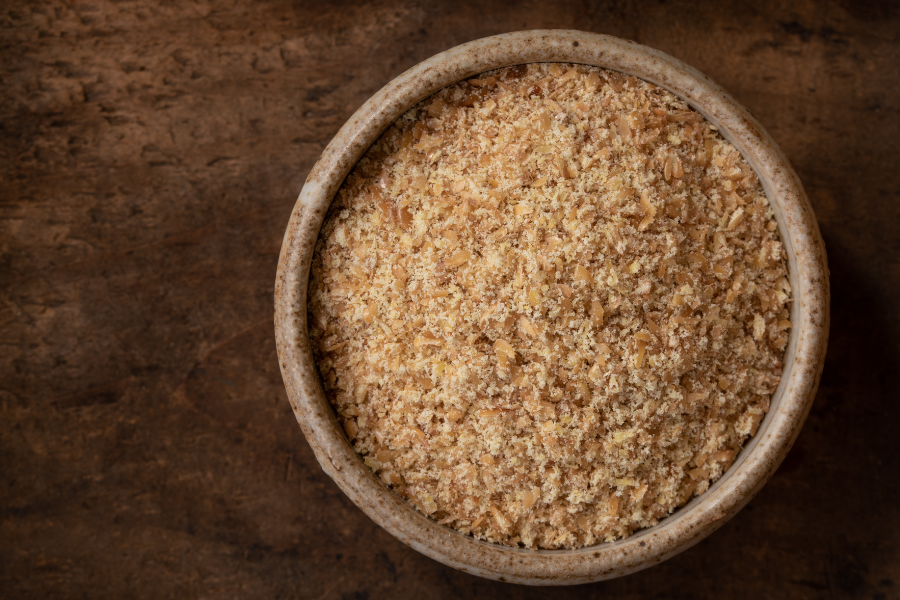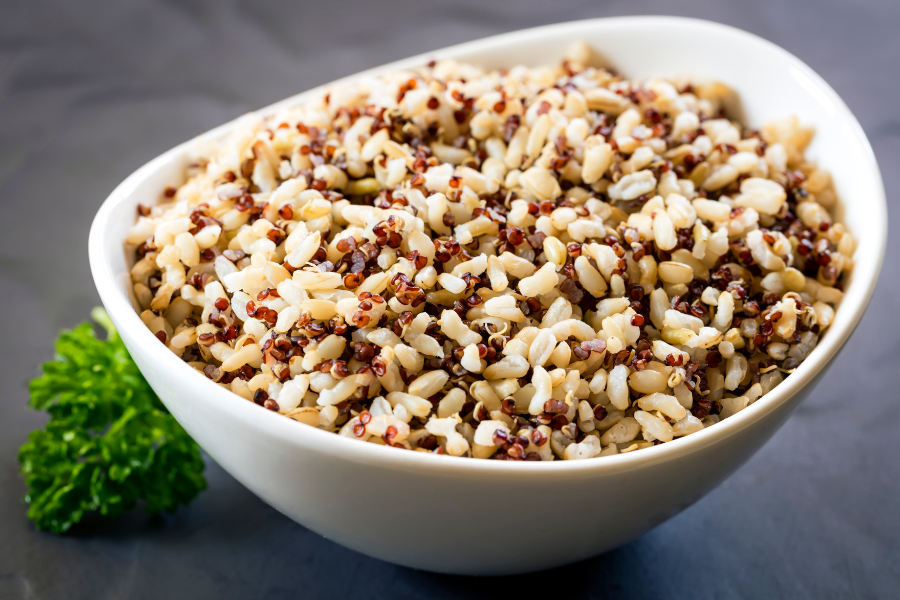If you have a dog child and you’re looking to optimize their health, you’ve come to the right blog. While there are a lot (thousands) of dog treat and dog food brands on the market today claiming to give your dog magical powers, when it comes to dog nutrition, simplicity is often the best route.
This is where flaxseed steps in. These tiny seeds pack a strong nutritional-punch for us humans, but are they good for dogs too? Short answer: yes, dog's can eat flaxseed and it can be good for them.
In this blog, we are going to take a thorough look at flax and why you may want to consider incorporating it into your dog's diet (under your vet's supervision, of course).
What Are Flaxseeds Anyway?
Flaxseed is sort of like the cool cousin to chia seeds. These little brown or golden nutrient bombs are birthed from flax plants. They are packed full of a variety of good stuff like omega-3 fatty acids, fiber, and other vitamins and minerals. The health benefits of this little seed have been extolled for thousands of years. And guess what? They are not only consumed by humans. Many dog owners consider incorporating flaxseeds in their dog's diet. But hold your horses—or should we say hounds—because there are a few things you need to know first.
More Flax Background
Flaxseed originated in the fertile Middle East, in the fertile grounds of Egypt and Babylonia. It is thought to be one of the oldest crops cultivated by humanity, with cultivation dating back as early as 3000 BC. At first, people valued it because of its fibers, which had been used in making the fabric linen, revered for its durability and versatility.
Nutritional Jackpot
If flaxseeds had a CV (curriculum vitae - i.e. a resume), it would be an impressive one! Not only is flaxseed rich in fiber, which is good for the digestive tract, but it also contains high amounts of omega-3 fatty acids. Omega-3's are great for brain, heart, and skin health, and they aid in reducing inflammation. And that's not it, either! Flax is also loaded with with antioxidants and lignans. Some research has indicated that lignans can even play a role in cancer prevention.
Benefits of Flaxseeds for Dogs
Adding flaxseed to your dog's diet may just give them that shiny coat they have been dreaming about, due to those omega-3's. Omega-3 fatty acids can improve skin health and reduce itchy, irritated, or dry skin. And as mentioned earlier, the fiber in flax can boost digestion, helping to regulate your dog's movements (we mean bowel movements). Some owners also attribute improved mobility in their dogs to flax, something much-needed in older canines.
Fish Oil or Flaxseed for Your Dog?
Everyone and their brother knows the immense benefits of omega-3 fats. With flax and salmon oil both being rich sources of omega 3's, which is better for your dog? Well, each has a unique nutritional profile, and the answer really will depend on the nutritional needs of your pup. Salmon oil is rich in (get ready for a long word that we cannot pronounce) eicosapentaenoic acid, often referred to as just EPA. It also contains docosahexaenoic acid (DHA). Both EPA and DHA are the types of omega-3 fatty acids most readily used by the body. Flaxseed, on the other hand, contains alpha-linolenic acid (ALA), a type of omega-3 which our bodies, and your dog's body convert into EPA and DHA, but at a lower efficiency. So, while flaxseed provides a fantastic plant-based source of omega-3s, salmon oil typically packs a bigger punch when it comes to direct omega-3 availability! Whether you're team fish or team seed, though, both are excellent additions to a balanced diet.
Potential Risks and Considerations
Before you start funneling a ton of flax into your dog's meals, you should be aware of possible risks. Flaxseeds typically have a good safety profile for both humans and pets, but just like for humans, too much of a good thing is, well, not good. If dogs overdo it and eat too much flaxseed, this could give them digestive problems like gas and diarrhea. So, what is the easy way to avoid this? Just make sure you introduce flax gradually to your pup, and always feed it to them in moderation. Also, it is vital that the seeds are ground; whole flaxseeds can pass through your dog’s digestive system without providing any nutritional benefits.
Choosing the Right Form
When it comes to feeding flaxseeds to your dog, you got some options. We think ground flaxseeds are the way to go. If flax seeds are unground, dogs won't actually digest them - they will just go right through their digestive system (and you will see them on the other end, if you know what we're sayin').
Another good option is flaxseed oil, which has all of the fatty acid-benefits of flaxseed, it just does not contain any dietary fiber.
How Much Flaxseed Should You Feed Your Dog?
Controlling exactly how much food, treats, and supplements you give your dog is something we cannot emphasize enough. In the case of flaxseed and flax oil, a little goes a long way. For all the small dogs out there (raise your paws!), a quarter of a teaspoon (of ground flaxseed) will do. If you have a medium or larger doggo, you can give them a bit more - up to a teaspoon. Always err on the side of smaller portion sizes when it comes to flax, and see how your dog responds before adjusting dosage.
How to Tell if Your Dog Had Too Much Flax
Say your dog broke into the flaxseed stash and downed a lot of flaxseed...rut row! Before you hit the panic button or call 911 (that is a joke, if you actually have a pet emergency please call your vet or an animal hospital), take a deep breath. Unless your dog ate an inordinate amount of flax, they will probably be okay. They will likely fight through some tummy troubles (mainly because of all that fiber). But if symptoms worsen or persist, you should definitely give your vet a ring.
DIY Flaxseed Treats
If you are a DIY person, you can easily work flaxseeds into some tasty treats for your pooch. Try creating some simple homemade dog treats with ground flaxseeds as the key ingredient. Our favorite dog treat recipes have peanut butter in them!
Chia vs. Flaxseed: Which Is Better for Your Dog?
Let's breakdown the differences between flaxseed and chia, to understand which might be a better choice for your dog. While both seeds can be good for dogs, they do have their differences:
- Chia seeds have a little more fiber than flax, which can be good for digestion.
- Chia contains antioxidants, omega 3's and calcium.
- Flaxseed also has fiber (albeit not quite as much as chia seeds).
- Flaxseed has compounds called lignans, which are known for their anti-inflammatory and possible anti-cancer properties.
- Flaxseed may be have a little more of an anti-inflammatory kick, because of the combination of lignans + omega-3 fatty acids.
The choice between flax and chia seeds really comes down to your dog's health, dietary needs, and you having a conversation with your vet. Maybe you will even decide to incorporate both seeds into your dog's diet!
Bringing It All Together
Let's sum things up, shall we? To answer the original question posed in this article - yes, dogs can absolutely eat flax and it can be a good addition to their diet. Flax can be beneficial to dogs in a few ways: it can help skin and coat health, digestive health (mostly because of the fiber content), and it can even reduce inflammation (thanks to the omega-3 fats!).
Introducing a new food or supplement into a dog's diet should be done very slowly. It is never a bad idea (we always recommend it) to check in with your vet before giving your dog flax, or any new food. Some dogs are more sensitive to dietary changes than others, and your vet can offer some tailored advice if you need it!
A huge perk of flax is that it is pretty doggon' easy to mix into your dog's diet. You can simply sprinkle a little flax in their dog food, or if you are feeling creative, you can get down with some DIY flax doggie treats!
References
1) Rees CA, Bauer JE, Burkholder WJ, Kennis RA, Dunbar BL, Bigley KE. Effects of dietary flax seed and sunflower seed supplementation on normal canine serum polyunsaturated fatty acids and skin and hair coat condition scores. Vet Dermatol. 2001 Apr;12(2):111-7. doi: 10.1046/j.1365-3164.2001.00234.x. PMID: 11360337.
2) De Silva SF, Alcorn J. Flaxseed Lignans as Important Dietary Polyphenols for Cancer Prevention and Treatment: Chemistry, Pharmacokinetics, and Molecular Targets. Pharmaceuticals (Basel). 2019 May 5;12(2):68. doi: 10.3390/ph12020068. PMID: 31060335; PMCID: PMC6630319.



